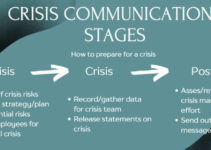Anti-crisis communication is the method of taking precautionary steps, setting guidelines for companies, and preparing them to manage any type of disruption and unexpected crisis event. It allows businesses and companies to prepare for the crisis and learn how to communicate with the public during the crisis. Today, we’ll discuss anti-crisis communication; its benefits, and the best strategies for crisis communication.
Benefits of Anti-Crisis Communication
- Ready-made and pre-planned crisis communication would help businesses and companies deal with the crisis
- Informing the general public and the employees during the crisis
- Employing multiple media channels to approach the mass audience
- Aligning employees with the company’s message
- Integrates the diverse and distributed workforce through crisis communication
- Employing AI tools to analyze social networks and be aware of the trends and public sentiments about the crisis
Strategies for Anti-Crisis Communication
Let’s discuss some of the main strategies and best practices for anti-crisis communication strategies; they’re as follows;
Preparing in Advance
First of all, every business and company should prepare in advance for different types of crises; cyber attacks, environmental, defective programs, and other types of internal and external crises. No business or company is prone to external crisis situations, events, and circumstances. Preparing in advance for the crisis in terms of having ready-made crisis communication templates would help them to effectively respond to the crisis.
Analyzing the Situation
When a crisis event occurs, companies should thoroughly analyze the crisis situation. It is in the form of the severity of the situation and analyzing its long-term impact on the company. However, it allows them to avoid making any type of mistakes and make a careful and effective decision.
Quickly Responding
Time is of the essence during a crisis situation. Every minute companies waste would spread rumors and increase confusion among the mass public about the crisis. They should avoid wasting time in preparing a well-drafted crisis communication message. Include the latest and existing information in the ready-made template and deliver the official message of the company about the crisis situation.
Selecting Spokesperson
It is significant for businesses and companies to have a special spokesperson who would address the crisis event and speak on the company’s behalf. Allocating clear roles and responsibilities in advance would help businesses and companies to effectively respond and manage the crisis situation.
Communicating with Stakeholders
Once the company has a special spokesperson, it should effectively communicate with various stakeholders and address the crisis situation. The stakeholders of the company could be suppliers, vendors, employees, partners, customers, and mass general public. It assures employees and customers that everything is under control and the company is taking necessary steps to manage the crisis situation.
Crafting Crisis Message
Content is the key to crisis communication. There is no room for mistake, blame game, deflecting, avoiding, and rejecting the crisis incident. Companies should be transparent and honest with their crisis communication response. It is significant for companies to accept responsibility for their actions, and it would send a positive message to the public.
Analyzing Social Media
Analyzing the feedback, comments, and reviews of customers over social media platforms is highly significant. It lets them know about the effectiveness of the crisis communication message of the company; concerns and questions of the public to the crisis response. However, it allows them to correct and review their crisis communication response based on the feedback of customers.
Correcting Misinformation
If there is any misinformation over the social media platforms relevant to the crisis event and the company’s response; they should conduct a press conference and the media’s interviews. The objective is to clarify the company’s standpoint to the media and public and clarify any type of confusion in the customer’s mind. It would help the company to take control over the narrative of the crisis communication.
Compassion & Empathy
While addressing the crisis concerns and queries, companies should follow the compassionate and empathic crisis communication approach. It allows them to build a trusting relationship with their target audience. They would know that the company understands their feelings and what they’re going through; they’re taking all the measures to resolve the crisis with limited damage.
Learning from the Crisis
There are many things companies could learn from every crisis event. It could be in the form of effective crisis communication, the right communication message, things to say and what to avoid; most effective communication channel to connect with the targeted audiences. These key insights help companies to effectively manage and deal with the crisis next time in the future.
Conclusion: Anti-Crisis Communication
After an in-depth study of anti-crisis communication; we have realized that anti-crisis communication is highly significant for businesses and companies during disruption. If you are learning about crisis communication strategies; then you should keep in mind the abovementioned strategies, best practices, and effective crisis response.
Ahsan is an accomplished researcher and has a deep insight in worldly life affairs. He goes Live 3 days a week on various social media platforms. Other than research writing, he’s a very interesting person.


